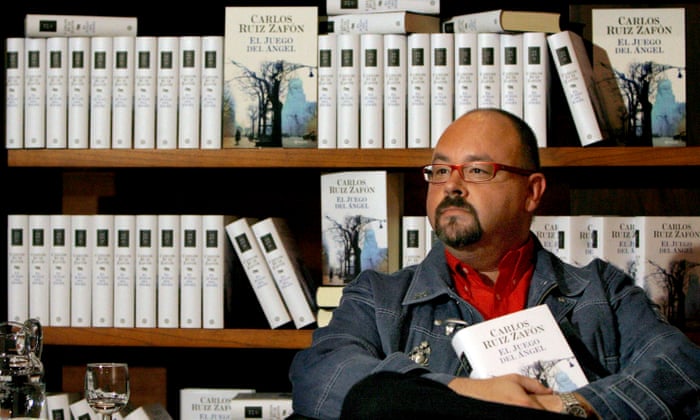 |
| Cervantes' only equal in literary impact … Carlos Ruiz Zafón. Photograph: Alberto Estévez |
The Shadow of the Wind and the remarkable success of Carlos Ruiz Zafón
Although modelled on the storytelling of Dickens and Tolstoy, his enormously popular novels were sharply attuned to our times
Mark Lawson
Fridady 19 June 2020
A
lthough all of Carlos Ruiz Zafón’s most successful books were published in the 21st century – The Shadow of the Wind, the first of the quartet on which his reputation rests, appeared in Spanish in 2001, and in English three years later – he was, at heart, a 19th-century novelist. His aim, in which he succeeded, was to emulate the narratively propulsive but socially reflective fiction of Charles Dickens, Wilkie Collins and Leo Tolstoy.
Another pivotal influence was even more distant: back to the start of the 17th century and the book often regarded as the birth of the modern novel: Don Quixote, written by a compatriot, Miguel de Cervantes. It was often said in Spain that Ruiz Zafón was Cervantes’ only equal in literary impact, and the later writer’s fiction genuflected to that of his predecessor, especially in digressive style, tales within tales, and multiple subplots.
Sudden unexpected literary sensations usually result from two things: luck – a prominent review, urgent word-of-mouth, celebrity endorsement – and chiming with the times. And The Shadow of the Wind, which would sell 15m copies worldwide, somehow achieved all of these.
For Spain, the four books dramatise the lingering shadow of the Spanish civil war and the dictatorship of General Franco. Ruiz Zafón, who was 11 when Franco died, grew up in a Spain that would become a constitutional monarchy, a member of the EU, an ally of the US in Iraq – but increasingly struggled to hold on to Catalonia. In common with the best historical novelists, he wrote about his own times through older ones. The lost, lamented and redacted stories that form the spine of the quartet reflect the long historical willingness of the Spanish state, and its partner the Catholic church, to silence writers and writing.
Sudden unexpected literary sensations usually result from two things: luck – a prominent review, urgent word-of-mouth, celebrity endorsement – and chiming with the times. And The Shadow of the Wind, which would sell 15m copies worldwide, somehow achieved all of these.
For Spain, the four books dramatise the lingering shadow of the Spanish civil war and the dictatorship of General Franco. Ruiz Zafón, who was 11 when Franco died, grew up in a Spain that would become a constitutional monarchy, a member of the EU, an ally of the US in Iraq – but increasingly struggled to hold on to Catalonia. In common with the best historical novelists, he wrote about his own times through older ones. The lost, lamented and redacted stories that form the spine of the quartet reflect the long historical willingness of the Spanish state, and its partner the Catholic church, to silence writers and writing.
In their English-language editions, the books were greatly helped by early championing from Stephen King, usefully himself a populist novelist notably interested in meta-fiction, with many of his books involving writers tormented by their readers, characters or pseudonyms. And in the UK in particular, The Shadow of the Wind seems to have arrived at an opportune time. While the sought-after book that speaks secret volumes is a long-standing literary device (including in The Name of the Rose by Umberto Eco, a clear influence on Ruiz Zafón), it’s striking how many of his contemporaries also wrote about secret or forbidden libraries. When it was published in English, suppressed knowledge was central to two of the biggest hits of that year: Jonathan Strange and Mr Norrell by Susanna Clarke and The Da Vinci Code by Dan Brown. And the two dominant literary sequences of the period – Terry Pratchett’s Discworld novels and JK Rowling’s Harry Potter books – both feature significant sinister archives: the Unseen University of Ankh-Morpork and the roped-off Dark Arts section of the Hogwarts school library. By 2007, when Markus Zusak’s The Book Thief itself became another global hit, books within books had become a hugely lucrative publishing sub-genre.
In retrospect, it seems likely that these stories were informed, consciously or not, by the rise of the internet and of digital storage, and consequent concerns about retrieval, deletion and falsification of data; then, in the “dark web” and the “deep state”, fear of what is going on unseen. For all its historical models, The Cemetery of Forgotten Books also strongly reflects, in this respect, our world. But alert to both national and international history, past and present, Ruiz Zafón’s stories of books without readers seem unlikely to ever suffer that fate themselves.


No comments:
Post a Comment